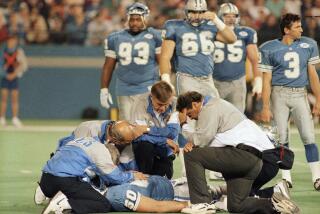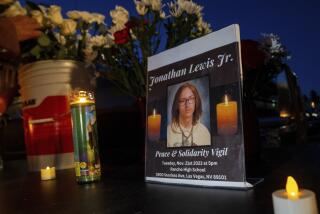Their Saving Grace
- Share via
The importance of high school coaches taking seriously their required training in cardiopulmonary resuscitation was reinforced when two wrestling coaches, Paul Mole of Simi Valley Royal and Chris Ferree of Atascadero, faced a life-threatening situation last week.
Dave Talley, a Royal senior competing in the 171-pound weight class, collapsed during a match in the Upland tournament on Dec. 29.
He stopped breathing and didn’t have a pulse. Mole, a former Marine, started a rescue-breathing procedure. Ferree, a health teacher who has taught CPR for 11 years, applied chest compressions. It was an intense, emotional eight-minute quest to revive Talley.
And it worked.
Although he was unconscious, Talley had started breathing and regained his pulse by the time paramedics arrived. He was transported by helicopter to Arrowhead Regional Medical Center in Colton.
Last Friday, Talley was released from the hospital. On Wednesday, he was back in school.
His parents, John and Irene, credit the coaches for saving his life.
“We believe it was a miracle,” Irene said.
Talley was in the final seconds of a match against a wrestler from Rialto Eisenhower when he dropped to his belly. There was immediate concern because Talley’s breathing was very shallow.
Mole and then Ferree went onto the mat to provide assistance. Talley’s parents watched nearby with growing alarm.
“When you see your son not breathing and turning blue there’s some tension and trauma,” John said. “I was not doing well. As things progressed, it was evident it was very serious and a life-threatening situation.”
Neither Ferree nor Mole had time to think of consequences or worst-case scenarios.
Their most difficult moment was deciding whether to turn Talley over from his belly for fear he had sustained a neck injury. Mole said there was no pause for second-guessing.
“If we hadn’t turned him over, he would have died,” Mole said.
Mole remembered the three words he had been taught in CPR class: look, listen, feel.
“Look at his chest, listen for signs of breathing and feel for a pulse,” he said.
The coaches went to work in the small dance room as wrestlers and adults were cleared out. Two trainers working in the adjacent gymnasium at Upland High arrived, but it was Mole and Ferree who were in charge.
Ferree administered 15 chest compressions, then Mole offered two breaths and listened for a response. They went through four cycles of the same task each minute for eight minutes.
“We just did it,” Ferree said. “It was crazy.”
Said Mole: “What I learned is what I already knew: stay calm and get people around you calm. When he was taken out in the helicopter, that’s when I sat down and I couldn’t believe what I did. He went from a breathing wrestler to his heart stopping in a minute. I couldn’t sleep that night.”
Under Title V of the California Administrative Code, every public school coach is required to be certificated in CPR and first aid, but that doesn’t mean all of them pay attention to the training or take it seriously.
“They always whine and moan because it’s the same thing every time,” said Marcia Schneider, a registered nurse who teaches CPR to coaches in the Simi Valley district.
She’s the one who gave Mole his instruction in the annual class, in which participants receive a grade of pass or fail.
“Now he gets an A,” she said. “It was second nature for Paul. That’s what I was really proud of. He saved a kid’s life.”
Mole, 31, and Ferree, 36, had never used their CPR training on a person.
For Mole, it was more difficult than climbing a 30-foot fence during a Marine obstacle training course or facing an angry, shouting drill instructor.
“When I got done, it felt like I was doing it for an hour,” he said.
Talley remained unconscious for hours in the hospital. His parents videotaped the match and showed it to doctors trying to determine what happened. John said they could detect no specific injury from the tape, and medical tests have failed to determine a cause.
But Irene said after watching the tape at home, she saw that her son’s body had been twisted, particularly in the neck area. Doctors have recommended Talley stop competing in wrestling for now and he must wear a heart monitor for the next month as they continue to search for a cause.
On Thursday, Talley attended a wrestling match at Royal, and the school held a brief ceremony honoring Mole. Talley seems back to normal except for some short-term memory loss. He doesn’t remember what the coaches did, but he understands that their CPR training saved him.
“I’m just happy and grateful they were there and knew what to do,” he said. “Without them, I wouldn’t be here today.”
Although Mole and Ferree are being called heroes, each is more comfortable in the knowledge that they fulfilled their responsibilities as a coach.
“We feel awkward people wanting to talk to us,” Ferree said. “It’s something we had to do.”
*
Eric Sondheimer can be reached at eric.sondheimer@latimes.com.
More to Read
Sign up for Essential California
The most important California stories and recommendations in your inbox every morning.
You may occasionally receive promotional content from the Los Angeles Times.














